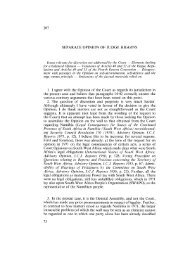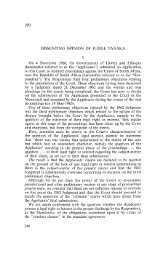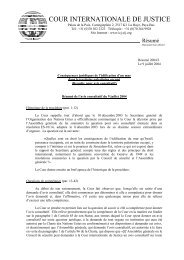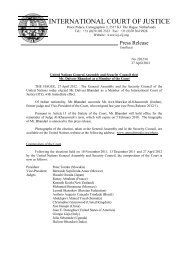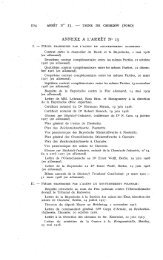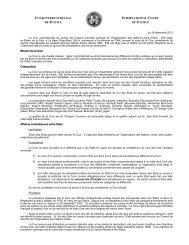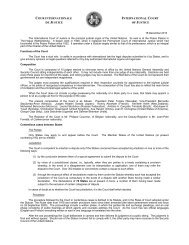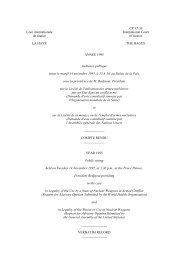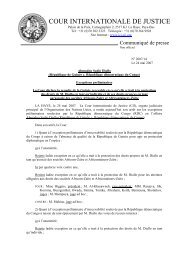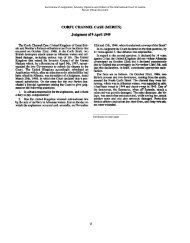botswana/namibia - Cour international de Justice
botswana/namibia - Cour international de Justice
botswana/namibia - Cour international de Justice
Create successful ePaper yourself
Turn your PDF publications into a flip-book with our unique Google optimized e-Paper software.
105. The South African regime therefore sought to create a buffer of pliant states in the fight<br />
against liberation forces operating from outsi<strong>de</strong>. This was to be achieved through a series of<br />
non-aggression security pacts, or outright military attacks combined with economic<br />
strangulation. Those neighbouring states which were unwilling to address South Africa's<br />
concerns were not only attacked but were also occupied, as in the case of the occupation of<br />
southern Angola from 1982 to 1988.<br />
(D) Peaceful Co-existence<br />
106. Against this background, Botswana took a policy position of peaceful co-existence<br />
towards South Africa. She was only too aware of her lack of military capacity and of her<br />
economic <strong>de</strong>pen<strong>de</strong>nce on her big neighbour. As a signatory to the 1951 Geneva Convention<br />
relating to the Status of Refugees, Botswana had to give refuge and succour to all those who<br />
fled from political oppression and social injustice in their countries. However, the<br />
implementation of this policy had to be pragmatic, in or<strong>de</strong>r for Botswana to strike the correct<br />
balance between honouring her obligations un<strong>de</strong>r <strong>international</strong> law and assuring South Africa<br />
and Rho<strong>de</strong>sia that Botswana territory was not being used by the liberation movements to<br />
launch attacks against them. It should be noted, in this context, that Botswana did not<br />
establish an army until 1977 when Rho<strong>de</strong>sia began to attack the bor<strong>de</strong>r villages lying in the<br />
north-east of the country, un<strong>de</strong>r the pretext of conducting hot-pursuit operations. Hitherto,<br />
Botswana's stability had reduced the need for the establishment of a <strong>de</strong>fence force.<br />
107. It will be recalled that by April 1984, South Africa, apart from being the <strong>de</strong> facto power<br />
in Namibia, was occupying southern Angola. South Africa had imposed the so-called nonaggression<br />
pacts on Mozambique and Swaziland, and had established tra<strong>de</strong> missions in all the<br />
neighbouring countries, except Botswana and Zambia. South Africa therefore exerted all<br />
forms of pressure on Botswana, in or<strong>de</strong>r to force her to sign a non-aggression pact and to<br />
agree to the establishment of a quasi-diplomatic office similar to those obtaining in other<br />
countries of Southern Africa: see Botswana Counter-Memorial, Annex 40.<br />
(E) Pressures on Botswana<br />
108. Botswana experienced the full range of pressures exerted by South Africa, which used<br />
such instruments of foreign policy as propaganda, economic and political pressure, as well as<br />
military power. Botswana was labelled as the main infiltration route for the liberation<br />
movement. This was a convenient accusation because Botswana shared the longest bor<strong>de</strong>r<br />
with South Africa. The pressure point was that a non-aggression pact would, among other<br />
things, facilitate the exchange of intelligence and joint patrols of the bor<strong>de</strong>r against guerrilla<br />
infiltration. When Botswana refused, she was accused of being an accomplice. Government<br />
agencies and officials were accused of collusion with the liberation movement in its fight<br />
against the apartheid regime. In Botswana's view, the cause of violence in South Africa was<br />
the policy of apartheid itself, which nee<strong>de</strong>d to be eradicated, if peace and stability were to be<br />
achieved.<br />
109. Other forms of pressure inclu<strong>de</strong>d sustained vilification, as a bad and uncooperative<br />
neighbour and, therefore, unworthy of western support. A bor<strong>de</strong>r slowdown was also<br />
introduced at the end of 1987, in or<strong>de</strong>r to disrupt cross-bor<strong>de</strong>r tra<strong>de</strong> and services. Subtle<br />
economic pressures, such as spreading stories that Botswana was unsafe for tourism and<br />
investment, were imposed. Military raids were launched against Botswana un<strong>de</strong>r the pretext<br />
of flushing out guerrilla bases hid<strong>de</strong>n in the urban areas. The most sustained of such raids was



